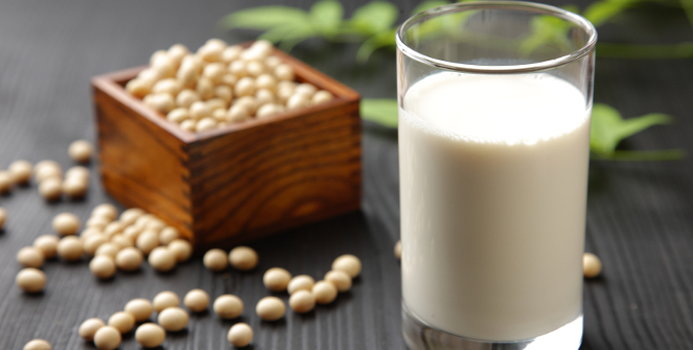Soy milk and almond milk are the top two most popular dairy milk alternatives. They are highly recommended breakfast drinks for people with casein allergies, lactose intolerance, diabetes or heart diseases. There is really no say in which of them is better for you. Each is advantageous in some respects and has shortcomings in others.
Dietary Limitations
Both soy and almond milk are suitable vegan substitutes for people who cannot tolerate dairy. They are also gluten free and can be used by people with coeliac disease. However each of these products contains their own allergens. Soy allergies are more common and more serious is children. Accidental ingestion of soy milk can instigate swelling, hives, diarrhea and vomiting. You should not drink almond milk if you have peach or tree nut allergy. Allergic reactions to almond milk are similar to those for soy milk, but almond allergies may also lead to congestion of airway, resulting in respiratory difficulties and insufficient oxygenation.
Nutritional Comparison of Almond and Soy Milk
Though almond milk is higher in fat content than soy milk, it is much less starchy. Therefore in terms of total calories, almond milk is usually more advantageous for dieters. Unsweetened almond milk contains as low as 40 calories per cup whereas soy milk has almost double the amount. It should be noted that both soy and almond milk fat are good for you. They are a composition of omega-3 and omega-6 fatty acids which are conducive to cholesterol and blood pressure reduction, protection against cardiovascular and neurological diseases.
Soy milk, on the other hand, holds more proteins. One cup of soy milk contains about 7 grams of protein compared to the 4 grams in almond milk. Soy and almond milk are also concentrated with extra fiber. Each serving may contain between 1 to 4 grams of dietary fiber, depending on the richness of the milk and its level of fortification.
Both soy and almond milk are superb sources of B vitamins. Higher intake of these vitamins helps to raise your basal metabolic rate so that you burn fat and calories more efficiently. Soy and almond milk are also excellent sources of all essential minerals including iron, magnesium, phosphorous, zinc, copper and manganese. These minerals help control your blood pressure, improve your blood oxygenation, and protect you against diseases. One notable advantage of almond milk is that it is much higher in vitamin E and manganese, making it a more powerful drink for improvement of skin quality and protection against cancer.
Soy Milk's Hormonal Effects
Drinking soy milk can be super beneficial for people over age 50 because it helps to relieve postmenopausal symptoms in women and prevent prostate cancer in men. But it may cause certain adverse effects for those who are in their reproductive years. Though not yet confirmed, soy milk has been suspected for reducing male fertility and sperm count. Soy sterol may interfere with progesterone production during pregnancy, and thus should be avoided if you are an expectant mother. Soy sterol may also counteract the effects of chemo and tamoxifen therapy. Breast cancer patients are much better off drinking almond instead of soy milk during treatment and remission.



